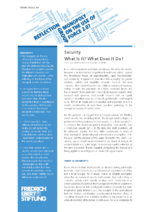Think Piece 09: Security - What is it? What does it do?
Summary
- The monopoly on the use of force is a concept that is strongly interlinked with the idea of a state providing security. Therefore it is crucial to consider the different meanings and implications of »security« when reflecting on the future of the monopoly on the use of force.
- We suggest that two broad avenues for thinking about security may be distinguished from each other. The first perspective displays a preference for the question what security is. By contrast, the second perspective emphasizes what security does.
- »What is security?«: Many critiques of traditional security studies do not contest the ontology of security itself, but instead denote variations of an »essentialist« understanding of the security paradigm.
- »What does security do?«: Security can also be understood as an inter-subjective social practice. The securitization literature argues that security is what people say. It is a selfreferential practice that does not refer to something »more real« and attains visibility only in deliberate social conduct.
Boemcken, Marc von; Schetter, Conrad
Security
Berlin, 2016
Zum Download (PDF) (205 KB, PDF-File)
Latest Issues
- Mely Caballero-Anthony, Frieden und Sicherheit | Publikation
Think Piece 22: Security in Times of Uncertainty in Asia
Asias security outlook still appears to be laden with uncertainties. From the changing dynamics in the balance of power, an emboldened North Korea and…
- Ann L. Phillips, Frieden und Sicherheit | Publikation
Think Piece 21: Providing Security in Times of Uncertainty
The final report, distills the findings of a two-year effort by more than 20 international experts to find answers on how to overcome rising…
- Jaïr van der Lijn, Publikation
Think Piece 20: The future of the monopoly on the legitimate use of force - Four alternative global futures
The paper presents four alternative global futures for the monopoly on the legitimate use of force that aim to allow policy makers to embrace…
